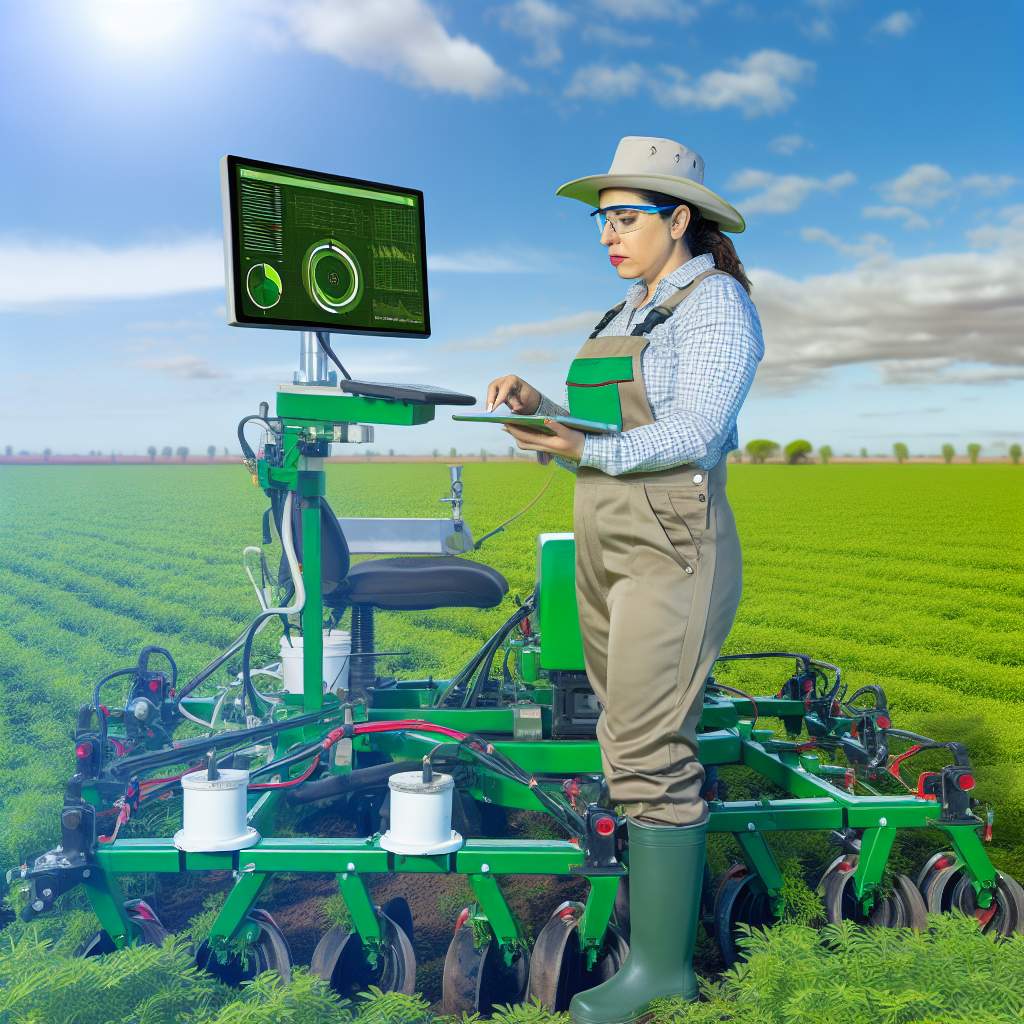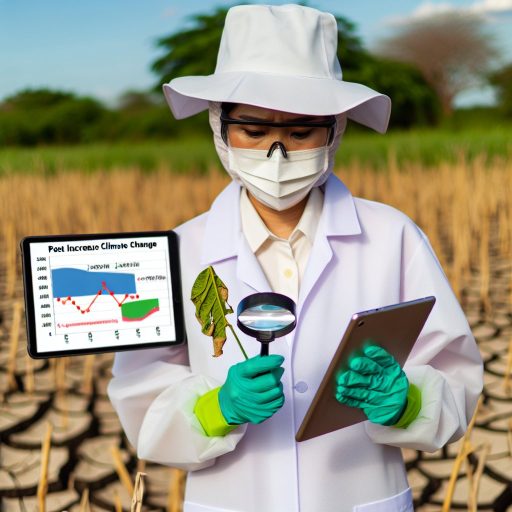Introduction:
Precision agriculture refers to the use of technology to optimize farming practices.
It aims to increase efficiency and productivity.
Over the years, it has evolved from basic GPS mapping to advanced data analytics and automation.
Government regulations play a crucial role in shaping the precision agriculture industry.
They establish standards, ensure food safety, and protect the environment.
Current Regulations:
Government agencies like the FDA and USDA set guidelines for the use of pesticides, fertilizers, and genetically modified organisms in precision agriculture.
Regulations also cover data privacy and cybersecurity.
These measures safeguard sensitive information collected by precision farming technologies.
Challenges Faced:
One challenge faced by the industry is the lack of uniform regulations across different regions.
This leads to inconsistencies in compliance requirements.
Additionally, rapid advancements in technology often outpace the development of regulatory frameworks.
This creates uncertainties for stakeholders.
Future Outlook:
As precision agriculture continues to grow, proactive collaboration is essential.
Industry stakeholders and government regulators need to develop adaptive and responsive regulations.
Efforts are underway to streamline the approval processes for new technologies.
This promotes innovation while ensuring that environmental and public health concerns are adequately addressed.
Historical overview of government regulations in precision agriculture:
When we look back at the early days of agriculture, there were minimal regulations in place.
Farmers had the freedom to operate their farms as they saw fit, with little interference from the government.
- Early regulations in agriculture:
- During this time, there were no specific rules or guidelines regarding the use of technology or precision techniques in agriculture.
- Farmers relied on traditional methods passed down through generations.
- Highlight key moments in history where regulations impacted precision agriculture:
- As technology advanced and precision agriculture became more prevalent, government agencies started to take notice.
- In the 1960s, the introduction of GPS technology revolutionized farming practices.
- Emphasize the role of government in promoting innovation while ensuring safety:
- The government played a crucial role in promoting innovation in precision agriculture by providing funding for research and development.
- However, they also had the responsibility to ensure that these new technologies were safe for both consumers and the environment.
Throughout history, government regulations have evolved to keep pace with the advancements in precision agriculture.
Today, there are a variety of regulations in place to ensure that farmers are using technology responsibly and ethically.
Transform Your Career Today
Unlock a personalized career strategy that drives real results. Get tailored advice and a roadmap designed just for you.
Start NowCurrent government regulations in precision agriculture:
- Regulations on pesticide use:
- One of the most important regulations in precision agriculture is the use of pesticides.
- The government has strict guidelines on how pesticides can be used to protect both human health and the environment.
- Data privacy regulations:
- With the rise of data-driven agriculture, there are concerns about data privacy and security.
- Governments have implemented regulations to ensure that farmers’ data is protected from misuse or theft.
- Regulations on drone use:
- Drones have become an essential tool in precision agriculture, but their use is regulated to ensure safety and privacy.
- Farmers must adhere to guidelines on where and how drones can be used.
- Regulations on genetically modified organisms (GMOs):
- Another area of concern is the use of GMOs in agriculture.
- Governments have regulations in place to monitor and control the use of genetically modified crops to protect biodiversity and human health.
Overall, government regulations play a crucial role in shaping the future of precision agriculture.
By balancing innovation with safety and ethical considerations, governments can ensure that farmers have access to the tools they need to increase productivity while protecting the environment and public health.
Current government regulations in precision agriculture:
The existing regulations governing precision agriculture involve aspects such as data privacy and environmental protection.
These regulations aim to ensure that the use of technology in agriculture is safe and sustainable.
Different agencies are involved in regulating the industry, including the Environmental Protection Agency (EPA), the U.S. Department of Agriculture (USDA), and the Federal Communications Commission (FCC).
Each agency plays a specific role in overseeing different aspects of precision agriculture, such as pesticide use, data collection, and wireless communication.
Regulations have a significant impact on farmers and technology providers in the precision agriculture sector.
Farmers must comply with regulations related to pesticide use, soil conservation, and data privacy, which can affect their operational practices and costs.
Technology providers, on the other hand, must ensure that their products and services meet regulatory standards and requirements.
This can influence their research and development efforts and market access.
Moreover, regulations shape the adoption and deployment of new technologies in precision agriculture.
For instance, regulations may govern the use of drones for crop monitoring, the deployment of autonomous machinery for field operations, or the collection and sharing of data from precision agriculture systems.
These regulations can either facilitate innovation and growth in the sector or create barriers to the adoption of new technologies.
Summary of current government regulations in precision agriculture:
- The existing regulations focus on data privacy and environmental protection.
- Agencies involved include EPA, USDA, and FCC.
- Regulations impact farmers’ practices and costs.
- Technology providers must meet regulatory standards.
- Regulations influence the adoption of new technologies in precision agriculture.
Gain More Insights: Success Stories of Agricultural Marketing Specialists
Challenges Faced by the Industry Due to Regulations
Outline common challenges faced by precision agriculture due to government regulations:
- Lack of clarity in regulations
- Complex and conflicting regulations
- Costly compliance measures
- Difficulty in keeping up with changing regulations
Discuss how regulations can slow down innovation:
Government regulations aimed at ensuring safety and environmental protection can sometimes stifle innovation in precision agriculture.
The need for compliance with rigid rules and standards can impede the development and adoption of new technologies and practices.
Start-ups and small businesses may find it particularly challenging to navigate the regulatory landscape and meet the stringent requirements set by regulatory bodies.
Showcase Your Business Today
Reach thousands of readers actively exploring professional services. Publish your business profile and grow your audience now.
Publish NowHighlight potential conflicts between regulatory bodies and industry stakeholders:
Conflict may arise when regulatory bodies impose restrictions or guidelines that are perceived as hindering the progress of precision agriculture.
Industry stakeholders, including farmers, technology providers, and researchers, may feel that regulations are too restrictive.
They may also believe that regulations do not adequately consider the unique needs and challenges of the industry.
This can lead to tension and disagreements between regulators and those directly impacted by the regulations.
While government regulations are vital for ensuring safety, environmental protection, and overall industry standards, it is essential to strike a balance.
Regulations should promote innovation and growth in the field of precision agriculture.
Collaborative efforts between regulatory bodies and industry stakeholders are crucial.
Such collaboration can develop regulations that are effective, practical, and supportive of advancements in technology and practices within the industry.
Gain More Insights: Technology in the Agricultural Loan Industry
Benefits of government regulations in precision agriculture:
- Examine the positive impact of regulations on consumers and the environment.
- Discuss how regulations can promote sustainable practices in agriculture.
- Highlight the role of regulations in ensuring food safety and security.
Government regulations play a crucial role in shaping the landscape of precision agriculture.
These regulations not only help protect consumers and the environment but also promote sustainable agricultural practices.
By enforcing regulations, governments can ensure food safety and security for all citizens.
Positive impact of regulations on consumers and the environment:
Government regulations in precision agriculture have several benefits for consumers and the environment.
One of the key advantages is that regulations help ensure that consumers have access to safe and high-quality food products.
By setting standards for the use of technology and pesticides, regulations can minimize the risk of harmful chemicals contaminating food products.
Moreover, regulations can also have a positive impact on the environment by promoting sustainable agricultural practices.
By imposing restrictions on the use of certain pesticides or fertilizers, governments can help reduce the environmental impact of agriculture.
This can help prevent pollution of water sources and soil degradation.
Promotion of sustainable practices in agriculture:
Regulations play a crucial role in promoting sustainable practices in agriculture.
By setting guidelines for precision farming techniques, governments can encourage farmers to adopt practices that are environmentally friendly and economically viable.
For example, regulations may require farmers to implement precision planting methods or use organic fertilizers to minimize their impact on the environment.
Additionally, regulations can incentivize farmers to adopt practices that promote soil health and biodiversity.
By supporting practices such as crop rotation or cover cropping, governments can help improve soil fertility and reduce the need for chemical inputs.
This can lead to healthier and more resilient agricultural ecosystems in the long run.
Role of regulations in ensuring food safety and security:
Government regulations are essential for ensuring food safety and security in precision agriculture.
By setting standards for food production and labeling, regulations help consumers make informed choices about the products they purchase.
This can help prevent foodborne illnesses and ensure that consumers have access to nutritious and safe food options.
Furthermore, regulations can also play a critical role in ensuring food security by regulating the supply chain and distribution of agricultural products.
By monitoring the production and distribution of food products, governments can prevent food shortages and ensure that all citizens have access to affordable and nutritious food options.
This is particularly important in times of crisis or natural disasters when food supply chains may be disrupted.
Find Out More: Climate Change and Its Effects on Rangeland Management

Future Outlook for Government Regulations in Precision Agriculture
Predict potential changes in regulations for the industry:
- With the rapid advancement of technology in precision agriculture, it is likely that regulations will need to adapt to keep up with these changes.
- Regulations regarding data privacy and ownership, as well as the use of drones and other emerging technologies, may need to be updated to ensure the industry operates ethically.
- The government may need to establish guidelines for the use of AI and machine learning algorithms to ensure transparency and accountability in decision-making processes.
Discuss how emerging technologies may influence future regulations:
- Emerging technologies such as blockchain, IoT, and satellite imaging are revolutionizing the way farms operate and collect data.
- These technologies have the potential to significantly improve efficiency, sustainability, and traceability in agriculture but may also raise concerns about data security and trustworthiness.
- Regulations may need to address issues related to data interoperability, standardization, and the potential for data monopolies to ensure fair competition in the industry.
Speculate on the role of government in promoting growth and innovation in precision agriculture:
- Government support through funding, grants, and incentives can play a crucial role in driving innovation and adoption of precision agriculture technologies.
- Policies that encourage collaboration between government, research institutions, and industry stakeholders can accelerate the development and deployment of cutting-edge solutions.
- Regulatory frameworks that strike a balance between promoting innovation and safeguarding consumer and environmental interests are essential for the sustainable growth of the precision agriculture sector.
Discover More: 4-H Youth Development: Collaboration and Impact
Exploring the Role of Government Regulations
In exploring the intersection of precision agriculture and government regulations, several key points have emerged.
Government regulations play a crucial role in ensuring that the adoption and implementation of precision agriculture technologies are done in a sustainable and responsible manner.
Regulations help to address issues such as data privacy, environmental impact, and the ethical use of technology in agriculture.
The importance of government regulations in shaping the future of precision agriculture cannot be overstated.
Showcase Your Business Today
Reach thousands of readers actively exploring professional services. Publish your business profile and grow your audience now.
Publish NowWithout clear guidelines and oversight, there is a risk that the potential benefits of precision agriculture may not be fully realized.
Worse, unintended consequences may arise.
Therefore, it is essential for regulatory bodies to continue to engage with industry stakeholders.
Developing policies that support innovation while safeguarding the long-term interests of farmers, consumers, and the environment is critical.
This blog post has only scratched the surface of the complex relationship between precision agriculture and government regulations.
To fully explore this topic, further discussion and collaboration are needed among industry players, policymakers, and regulatory bodies.
By working together, we can ensure that precision agriculture continues to advance sustainably and responsibly.
This collaboration ultimately benefits both the agricultural sector and society as a whole.
Let us continue to engage in dialogue and seek common ground to address the challenges and opportunities that lie ahead.
Additional Resources
USDA NIFA | National Institute of Food and Agriculture
Threats to Food and Agriculture Resources
[E-Books for Sale]
The Big Book of 500 High-Paying Jobs in America: Unlock Your Earning Potential
$19.99 • 500 High-Paying Jobs • 330 pages
Explore 500 high-paying jobs in America and learn how to boost your career, earn more, and achieve success!
See All 500 High-Paying Jobs of this E-Book
1001 Professions Without a Degree: High-Paying American Jobs You Can Start Now
$19.99 • 1001 Professions Without a Degree • 174 pages
Discover 1001 high-paying jobs without a degree! Unlock career tips, skills, and success strategies for just $19.99!




